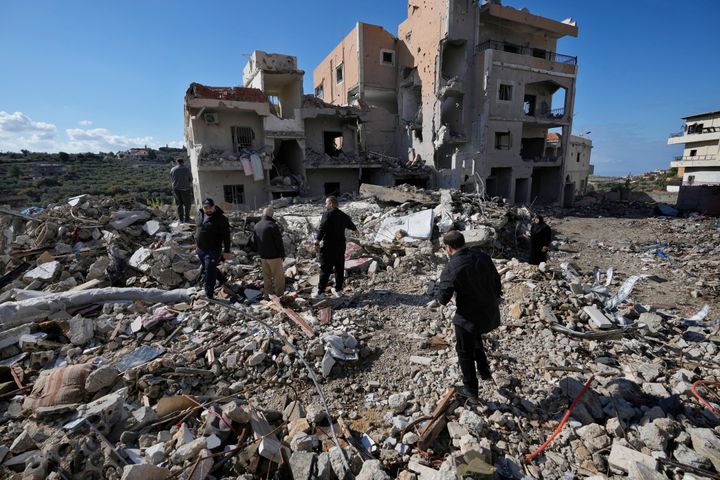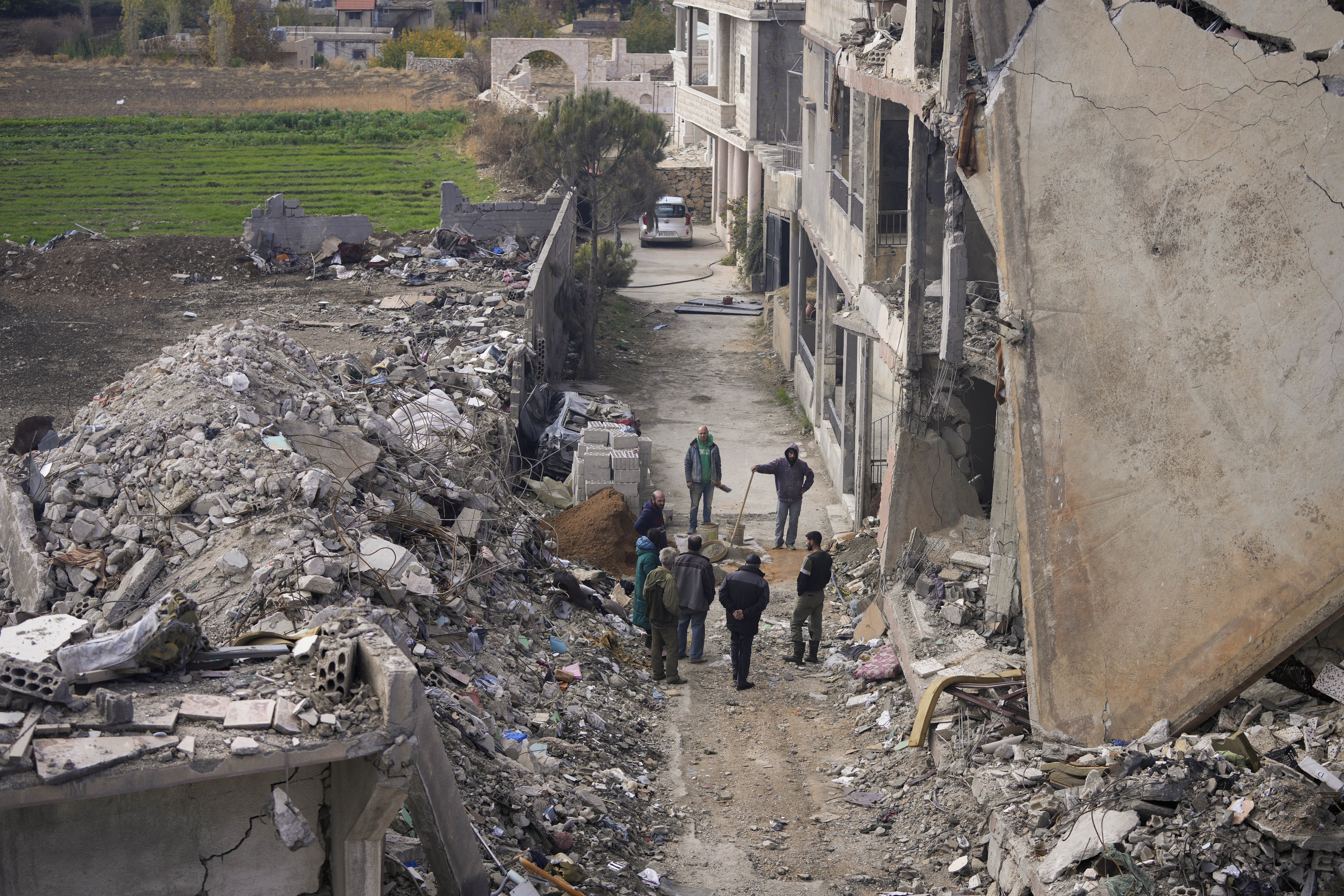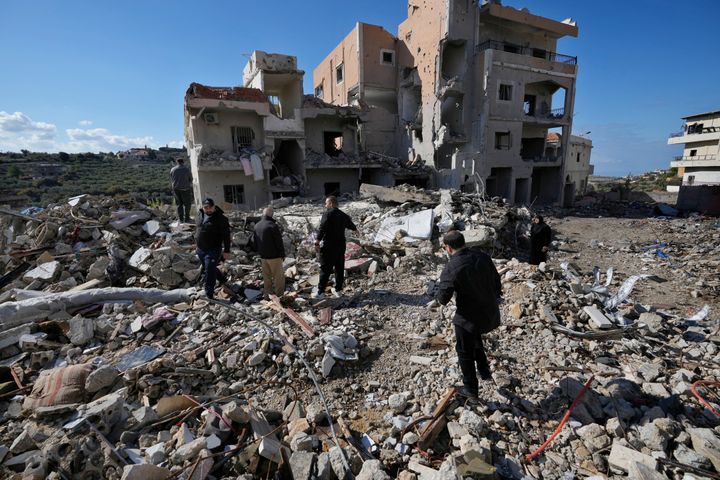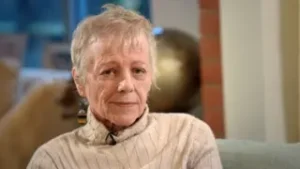Day 2 Of The Israel-Hezbollah Ceasefire Sees Israeli Airstrike On Lebanon And Scattered Attacks
The bursts of violence â with no reports of serious casualties â reflected the uneasy nature of the ceasefire that otherwise appeared to hold Thursday.


BEIRUT (AP) — Israel on Thursday carried out its first airstrike on Lebanon since a truce with Hezbollah announced this week, saying it targeted the militant group’s activity at a rocket storage facility in southern Lebanon that breached the ceasefire.
Lebanese authorities reported scattered incidents of Israeli mortar attacks, strikes and shots fired that wounded two people trying to return to southern Lebanon. Lebanon’s state-run media said the wounded were civilians, while the Israeli military described them as suspects who violated the terms of the truce that ended more than a year of conflict between Israel and Hezbollah.
The bursts of violence — with no reports of serious casualties — reflected the uneasy nature of the ceasefire that otherwise appeared to hold Thursday as Lebanese troops began to deploy in parts of southern Lebanon, the eastern Bekaa Valley and the southern suburbs of Beirut, where Hezbollah has based its operations.
The Lebanese military said it was setting up temporary checkpoints and detonating unexploded ordnance in hopes of helping displaced civilians return to their homes.
Some 1.2 million people were displaced in Lebanon during the country’s deadliest war in decades. Thousands of residents, their cars stacked high with mattresses and full of belongings, began to make the odyssey back to their war-ravaged towns on Wednesday, after the ceasefire took effect.
But their movements remain constrained. The Lebanese and Israeli militaries have ordered civilians displaced from border communities to steer clear of areas where Israeli troops are still in position.
On Thursday, the Israeli military said its troops opened fire at “several suspects” who arrived in their vehicles to certain parts of southern Lebanon in violation of the truce. The statement did not give further details.
Lebanon’s state-run National News Agency said Israeli fire wounded two civilians in Markaba, a village close to the border that has been a scene of intense fighting over the past 14 months. It also reported Israeli tank fire hitting some villages and farms in the south, causing no casualties.
Col. Avichay Adraee, an Arabic language spokesman for the Israeli military, announced that a nighttime curfew for Lebanese residents south of the Litani River remained in effect, banning movement from 5 p.m. Thursday until 7 a.m. Friday.
The Lebanese army accused Israel of breaking the ceasefire several times on Thursday by conducting strikes on Lebanon with “various weapons” and continuing to patrol and surveil Lebanese skies with warplanes and drones. The army said it was “following up on these violations in coordination with the relevant authorities,” without elaborating.
An Associated Press reporter in northern Israel heard Israeli drones buzzing and the sporadic crackle of machine-gun fire across the border in Lebanon.
Hezbollah has not issued any public statements on the alleged Israeli ceasefire violations but Hezbollah lawmaker Hassan Fadlallah acknowledged the incidents. When asked by reporters how Hezbollah would respond, he was cautious.
“We don’t want to rush things,” he said, adding that Hezbollah “has the right to self-defense.”
The truce between Israel and the Iran-backed Hezbollah, brokered by the United States and France, calls for an initial two-month ceasefire in which the militants are to withdraw north of the Litani River and Israeli forces are to return to their side of the border.
Under the terms of the agreement, Lebanese troops will gradually deploy further the south as Israeli troops pull out, said a Lebanese military official, speaking on condition of anonymity because they were not authorized to brief media.
The buffer zone would be patrolled by U.N. peacekeepers and Lebanese troops, which have not been a party to the conflict between Israel and Hezbollah. Lebanon’s military on Thursday shared photos showing troops clearing roads of destroyed vehicles, crushed houses and unexploded bombs.
For many Lebanese, the pause in fighting brought relief — but also heartache. Displaced families returned home to sift through the bombed-out ruins of their shops and apartments.
Drone footage of Qana in southern Lebanon, taken Thursday, shows ghostly, battered neighborhoods with smashed homes and giant craters gouged into the ground — the scale of destruction chilling in a town that has become synonymous with the killing of civilians in past wars.

During Israel’s 2006 war with Hezbollah, an Israeli strike on a residential building killed 27 civilians, a third of them children, according to U.N. figures. During its 1996 offensive, Israeli artillery shelling on a United Nations compound housing hundreds of displaced people in Qana killed at least 100 civilians and wounded scores more people.
“We are a town of martyrs,” said Aref AbouKhalil, a 29-year-old taxi driver who checked on his ruined family home in Qana on Thursday. Those who lost family and friends in the Israeli bombardment of Qana over the past year, he said, felt the grief of 2006 and 1996 all over again.
“They’re determined to destroy us, they keep trying, and now the town is destroyed,” he said of Israeli strikes. “But we’ll build it again.”
Israel says it plans to withdraw its forces, but only as it ensures Hezbollah observes the agreement.
“Any deviation from this agreement will be enforced with fire,” said Lt. Gen. Herzl Halevi, the Israeli military’s chief of staff. “We are now moving toward new phase, where the same determination that brought us to this agreement will be applied in enforcement.”
Of the 50,000 people who fled northern Israeli border communities because of constant Hezbollah attacks, Halevi said that ensuring their swift return was “our duty to them, and our duty to ourselves.”
A rare quiet, compared to recent months, fell over the border towns Thursday. There were air raid sirens warning of incoming Hezbollah rockets, no deafening explosions shaking the ground.
But with the towns largely deserted and residents relocated, Halevi’s remarks signaled the military was not encouraging Israelis to return just yet.
In Menara, an Israeli community on the border with views into Lebanon, around three quarters of homes are damaged, some with collapsed roofs and burnt-out interiors. A few residents could be seen gathering their belongings there on Thursday before leaving again.
Despite the smattering of attacks, the clearest sign of the truce Thursday was a reduction in the overall level of violence in Lebanon since the conflict began a day after Hamas’ Oct. 7, 2023 assault out of Gaza, when Hezbollah began firing rockets, drones and missiles in solidarity with the Palestinian militant group.
Israel retaliated with airstrikes, and the conflict steadily intensified before becoming an all-out war in mid-September. The war in Gaza is still raging with no end in sight.
We Need Your Support
Already contributed? Log in to hide these messages.
More than 3,760 people were killed by Israeli fire in Lebanon during the conflict, many of them civilians, according to Lebanese health officials. The fighting killed more than 70 people in Israel — over half of them civilians — as well as dozens of Israeli soldiers fighting in southern Lebanon.
___
Frankel reported from Menara, Israel. Associated Press writers Natalie Melzer in Nahariya, Israel, and Isabel DeBre in La Paz, Bolivia, contributed to this report.
___








